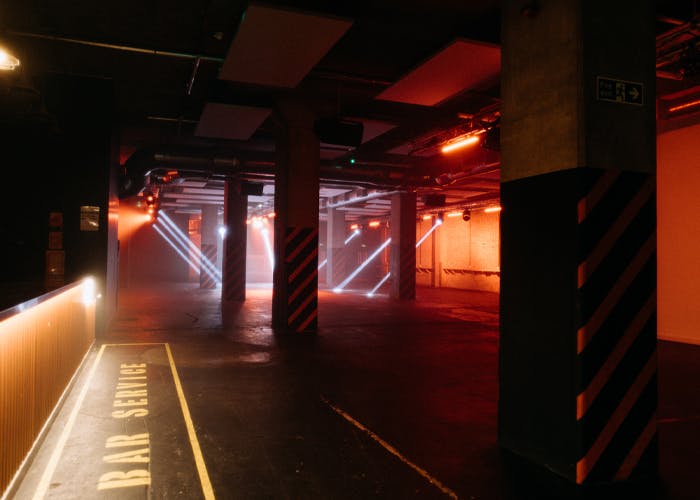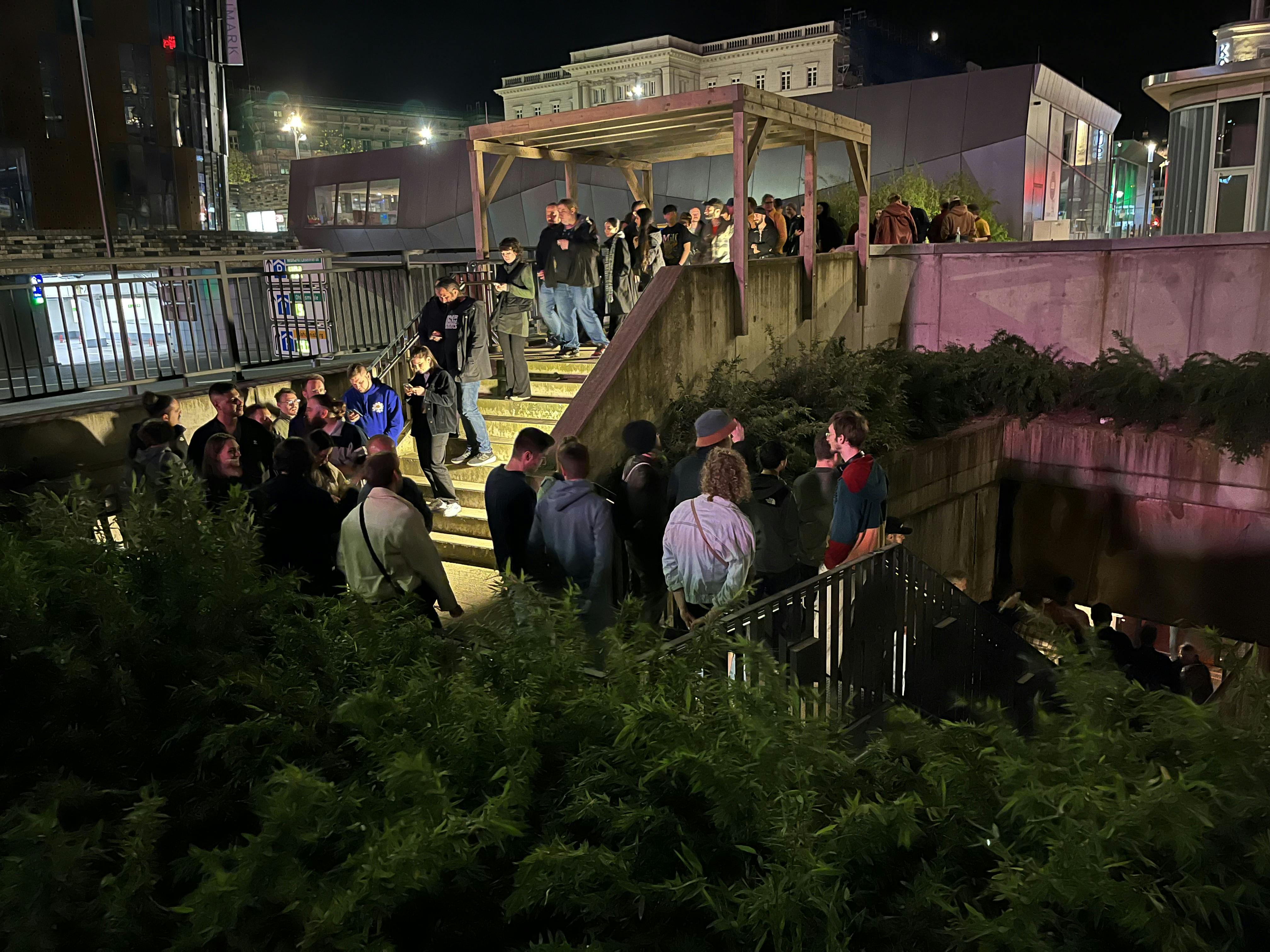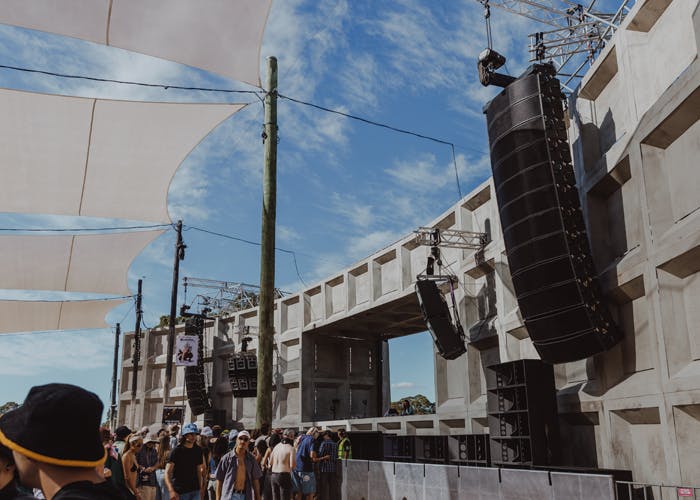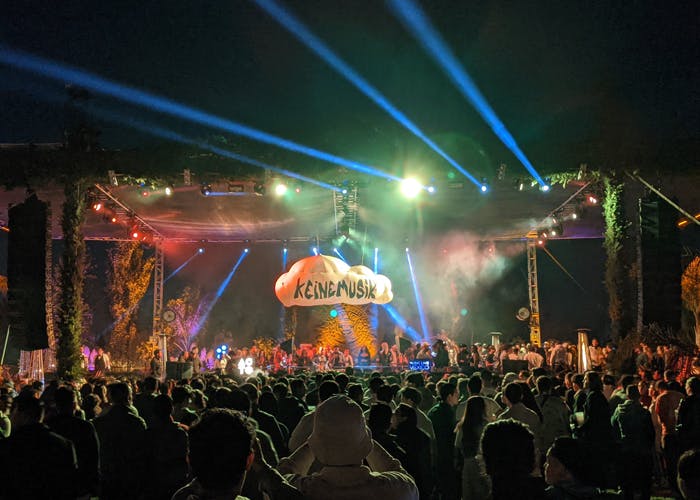
Open Ground Puts Wuppertal on the Map with Incredible Club Experience

In the heart of Wuppertal, Germany, a sonic revolution is taking place within the concrete walls of an underground bunker. In its first seven months, Open Ground has found its way onto the wish lists of DJs and clubbers alike, as its reputation has spread around Europe’s electronic music community and beyond. Veiled in a very deliberate cloak of secrecy that includes a strict no photos policy, the resulting content void has been filled with real experiences, harking back to the early days of the scene when news about an exciting record, venue or party spread organically through word of mouth. The subject on everyone’s lips is the sound.
When DJ Mantra appeared on Martha’s Radio 1 show a few weeks after her first visit to the club, it was clear she had been moved by the experience. "It's truly special. Standing in the middle of the dance floor, enveloped by that sound, is emotional. It can almost bring you to tears. The space and the sound create the perfect environment to hear music as it should be. It's deep, weighty and incredibly clean."
Open Ground was created and is operated by a local and international team. At its heart is Markus Riedel working in collaboration with Mark Ernestus, whose relationship traces back to Berlin's legendary record store, Hard Wax, founded by Ernestus in 1989. Riedel’s brother, Thomas, made the Open Ground project possible with his support and financial investment.
In 2008, Riedel moved back to his birthplace Wuppertal to be closer to family. At the time, the city’s authorities were planning a major redevelopment of the area around the main train station, with their plans including a club located in an underground bunker. “It’s not the first place where you’d think to launch an innovative club,” says Riedel. “But we’re not so far away from cities such as Brussels, Amsterdam or Berlin.”
It would take a total of seven years to transform from underground shelter into one of Europe’s most appealing clubbing destinations. “We realised that converting the bunker into a club was quite a task,” says Riedel. “We spent a long time planning, then a long time undertaking the development but in the end we’ve created something really special, with amazing sound in the two rooms and the area in between them too.”
From the outset, audio was at the top of the agenda and the choice of sound system was clear. Ernestus first connected with Funktion-One founder Tony Andrews in 2015. At the time, Andrews was working on the prototype of a 32” bass speaker, with the aim of achieving the lowest frequencies ever produced by a big system. On hearing the F132 for the first time, Ernestus was hooked.
“It’s giving us energy right down to 24Hz,” Andrews said at the F132’s launch in 2016. “These sorts of frequencies, horn-loaded, is a new experience for everyone; it has typically been ported boxes before now. The output is amazingly clean due to no cone deformation. Because it’s clean we can push the amplifier to its full potential. We powered up four of them together and it took me two weeks to forget the molecular impression it had on my body. I’ve never experienced anything like it.”
Andrews and the Funktion-One engineering team have been involved in Open Ground’s sound design from the early stages of the venue’s development, working in close collaboration with Funktion-One Germany and Bentin Projects. The distributor and integrator, which is also headquartered in Wuppertal, has strong links with the Riedel family through company founder Benedikt Koch. These bonds, together with an unwavering commitment to audio ensured the installed system stayed true to the specification.
“It was a real pleasure to be part of this right from the beginning,” says Koch. “Markus and his team were really supportive to make sure we could place the speakers in the right positions. It’s the first time ever in my working life that the air conditioning system was changed to give us the positions we needed.”
Open Ground’s main room system comprises four Funktion-One Evo 6E with Evo 6EL, two F221 bass speakers and, of course, a pair of F132 subs. The booth is home to two PSM318 DJ monitors. In the second room, the system has been designed with two Res 2, two F121, one F124 and an F132, along with two F1201 for monitoring.
To achieve an optimal listening environment, the venue has extensive acoustic treatment (designed by acoustician Willsingh Wilson) throughout to manage the reflections of the space, which is naturally abundant in hard surfaces.
Until now, Wuppertal wasn’t a city associated with electronic music, particularly the kind that Open Ground programmes. Germany’s major clubbing hubs are mostly known for techno, but the club is striking out into more eclectic sounds, hosting DJs such as Calibre, Ron Morelli, and Luke Una, highlighting the breadth and diversity of their offering.
“At Open Ground, we like to present all genres,” says Riedel. “Of course, techno is important but there are other sounds we love, from dubstep to bass and grime. That’s what makes our club so special.”
“I thought that for it to be worthwhile, we need to have international ambitions,” says Ernestus. “That’s the only way to make something work in a relatively small city. Many factors are out of your control but the one thing you can commit to is providing the highest quality sound system and acoustic treatment. If you do that and get it right, then you have something that will put you on the map and make the project worth pursuing for you and for artists who want to play there.”
DJs are certainly eager to play at Open Ground and many of the future line-ups are mouth-watering prospects for electronic music fans. “Josey Rebelle is one of our residents and in an interview she did with our team, she says she feels like she comes here to rave rather than DJ,” says Riedel. “We have a no bullshit policy and, alongside the sound and our line-ups, this has made us popular with DJs.”
Though Wuppertal may not have been an obvious location for a globally renowned club, the city offers opportunities that are reminiscent of what made Berlin so appealing all those years ago. “The cost of living is relatively low and there are plenty of places commutable from here which could work in the city’s favour,” says Ernestus. “It has some of the things in place that previously made Berlin attractive all those years ago, like space and low rents.”
“Ultimately, our space is all about the sound,” says Riedel. “We want Open Ground to be filled with nice people celebrating a good party, who are all there for the music.”
Seven years of setbacks, solutions and hard work have been rewarded with a genuine excitement circulating Europe’s electronic music and clubbing community that’s rooted in the quality of Open Ground’s sound and the dance floor experience, rather than an elaborate marketing strategy.
“The result of all this effort and attention to detail is incredible,” says Koch. “Special thanks to Tony Andrews and the Funktion-One team for their support and Bernhard Blank, Hannes Volk and the Open Ground team for their hard work. I am really proud of what has been achieved here.”

